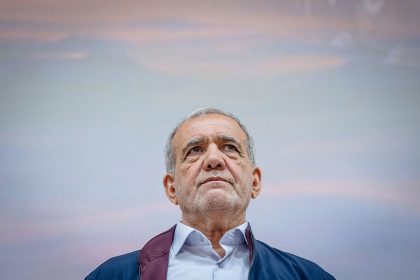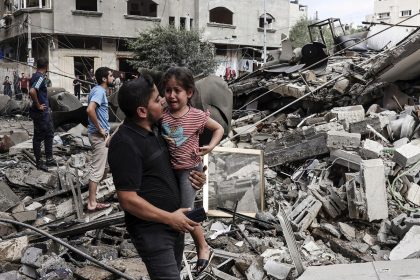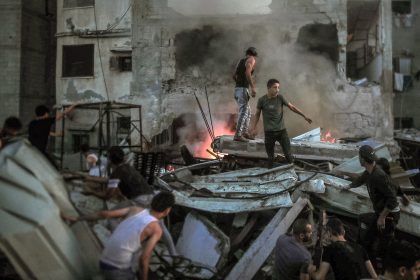[ad_1]
Joe Biden’s election has revived certain hopes that the landmark Iran nuclear deal, known formally as the Joint Comprehensive Plan of Action (JCPOA), may soon be restored and usher in a new era of stability to the region.
Biden vowed on the campaign trail he would rejoin the JCPOA and enter broad negotiations with the Islamic Republic to address a wide array of sticking points that continue to blight bilateral relations.
Iran, which resorted to so-called “remedial measures†after the Trump administration withdrew from the JCPOA in May 2018, has since rolled back several of its commitments under the deal, including recommencing its sensitive uranium enrichment activities.
At the same time, Tehran has indicated a readiness to embrace full JCPOA compliance if the US moves first to annul all the punitive sanctions imposed by Trump. With the nuclear accord now on life support, the two sides are now in a game of blind man’s bluff, waiting to see who will make the first reconciliatory move towards resuming the deal.
Mistrust between Tehran and Washington reached new highs after Trump nixed the JCPOA. The two long-time rivals’ provocations and recriminations since have made it costly and risky for either to take the first step to revive the accord, as defined in UN Security Council resolution 2231.
In his first wide-ranging interview since taking office, President Biden laconically said “no†when asked by a CBS News correspondent if the US would “lift sanctions first in order to get Iran back to the negotiating table.†When asked if Tehran would have to stop enriching uranium first, the US president nodded in affirmation.
The exchange captured the essence of the new US administration’s approach to Iran, at least for the time being. In Iran, where leaders are known to deliver lengthy sermons on all sundry of issues, reactions have been more elaborate.
In a meeting of foreign ambassadors residing in Tehran on the anniversary of the 1979 revolution, President Hassan Rouhani said, “today nobody can ask Iran why it is not taking the first step. Iran has been honoring its commitments.â€
He said if the original JCPOA signatories stuck to the commitments laid out under the deal, “they should know we’ll fulfill our obligations the following hour.â€
Iran’s Foreign Minister Mohammad Javad Zarif, in an interview with CNN on February 1, suggested that Josep Borrell, the High Representative of the European Union for Foreign Affairs and Security Policy and ex-officio coordinator of the JCPOA joint commission, can take an initiative to “synchronize†or “choreograph†the actions needed by Washington and Tehran so that there is no wrangling over the sequencing of reciprocal steps.
Re-establishing the previous international consensus achieved by Iran, the European Union, Russia, China and the US during Barack Obama’s presidency will involve complex logistical spadework, horse-trading and backdoor diplomacy, say analysts.
While it should not be difficult to actualize in theory, it may turn out to be time-consuming and complicated in practice, they say. Indeed, much has changed in Iran and the Middle East since the initial deal was clinched in July 2015.
For one, Iran is seeking compensation for the damages it says it sustained since Trump abrogated the deal and imposed new sanctions. The US and European trio of Britain, Germany and France, meanwhile, seek to append new provisions to the JCPOA to address Iran’s recent regional actions and maneuvers.
They also seek to include some of Iran’s rivals such as Saudi Arabia and United Arab Emirates in any new talks.
At the same time, the clock is ticking down fast for Rouhani, who as a lame-duck president has less than five months in office before June presidential elections to finalize a new understanding with the Biden administration.
Rouhani, who had sought to revive JCPOA and shake off Western sanctions as his presidential legacy, is under pressure by a conservative-dominated Parliament as well as the omnipotent Islamic Revolutionary Guard Corps (IRCG), neither of which, at least overtly, want fresh talks with Washington.
He also lacks a potent, popular reformist ally to back at the looming polls. Many experts believe Rouhani’s failure to revive the JCPOA and cushion Iran’s crashing economy through sanctions relief will pave the way for a hardline politician, most probably from the ranks of the IRGC, to win the presidency.
That’s because the majority of Iranians who had pinned their hopes on Rouhani to improve their economic prospects through engagement with the West are by now largely disenfranchised and may not vote in the presidential election, making it easier for a right-winger to win the poll.
“Six months is a very short period, and it will be difficult for both parties – Biden and Rouhani – to come to binding conclusions before Rouhani leaves as president. The Biden administration would need to cancel some sanctions imposed on Iran, which takes time. Moreover, Iranian conservatives are likely to stall the process,†said Robert Czulda, a specialist in international security and assistant professor at Poland’s University of Lodz.
Biden, moreover, would need to garner bipartisan congressional support to resuscitate the nuclear deal and rescind the broad-ranging sanctions Trump unilaterally placed on Iran.
Some of the sanctions slapped on the Islamic Republic since 2018 are not nuclear-related and fall within the scope of Countering America’s Adversaries through Sanctions Act (CAATSA), legislation pertaining to Iran’s alleged role in the sponsorship of terrorism.
Behrooz Ghamari-Tabrizi, professor of Near Eastern studies and director of Sharmin and Bijan Mossavar-Rahmani Center for Iran and Persian Gulf Studies at Princeton University, is doubtful that sanctions will be dropped quickly, if at all.
“I do not believe that there is enough time for Biden to build consensus in the US to lift the sanctions imposed during Trump in the short term. The Iranian side sees the lifting of sanctions as a prelude to reviving the JCPOA. If that does not happen, which I do not believe it will, then Rouhani would end his presidency without reinstituting the nuclear agreement,†he said.
At the same time, many observers share the view that when the next Iranian president is elected, he will not completely back away from what the JCPOA has achieved and may even seek rapprochement with the US. Iran’s next president will most likely rise from the IRGC or another establishment rearguard agency.
In Iran’s byzantine political structure, the president does not have the final say on foreign affairs, which is the jurisdiction of the all-powerful Supreme Leader Ali Khamanei. Rather, he plays a leading role in setting the tone and steering the direction of foreign relations.
“There is a large possibility that a former IRGC member could be Iran’s next president. While the Supreme Leader does make the final decisions on the direction and foreign policy strategy, the decision-making process remains consensus-based,†explained Sanam Vakil, a senior research fellow at Chatham House’s Middle East and North African Program.
“Consensus is reached in the Supreme National Security Council and the composition of the body is heavily impacted by presidential appointments to the cabinet. So, while the Iranian president does not wield significant power and independence, his voice and ideas can impact the policy making process,†she told Asia Times.
Iran’s next leader will look to leverage the appointment of a new Supreme Leader, a crucial transition for the country, during his tenure. He can also be expected to shore up Iran’s security stratagems after the Trump-era Abraham Accords rolled out a red carpet for Israel to cement its foothold in the Persian Gulf on Iran’s doorstep.
“IRGC is preparing itself for a new period, not only for a period after Rouhani but mainly for a period after Khamenei – the latter will have a significant impact. The IRGC will try to influence the selection of a new Supreme Leader, which will occur sooner than later. Khamenei is old and this is just a matter of time when a new leader has to be selected,†said Czulda, who is the author of the book Iran 1925–2014: Between Reza Shah and Hassan Rouhani.
A number of IRGC leaders have been publicly  floated as possible presidential nominees.
The most notable are General Hossein Dehghan, a former IRGC air force officer and the former minister of defense; General Saeed Mohammad, the chairman of the Khatam-al Anbiya Construction Headquarters, the globally blacklisted engineering arm of IRGC; General Rostam Ghasemi, the former chairman of the Khatam-al Anbiya firm and minister of petroleum under ex-president Mahmoud Ahmadinejad, and Parviz Fattah, a former director-general of the Cooperation Bonyad, also affiliated with the IRGC.
These men are not typical politicians that average Iranians would passionately root for in a presidential race. They lack the popular base of household names such as Rouhani and his predecessors Mahmoud Ahmadinejad and Mohammad Khatami.
But should enough of the country’s disillusioned urban electorate not turn up to cast their ballots, one of them can emerge the winner in an impassive competition with a low turnout.
“Domestically, the regime is aware of the growing disaffection that the population is feeling towards institutions, which are failing the people on many grounds: economically, politically and socially. A good dose of flexibility will be needed to fix – if possible – this situation,†said Paola Rivetti, an associate professor in politics and international relations at Dublin City University.
“It is unsurprising that conservative forces are pushing young candidates or candidates who have a background in working for the youth, at least nominally, or candidates who project an image of modernity and smartness, although they have had a continuous presence in state institutions,†she told Asia Times.
“Most importantly, the next president will likely have to manage a transitional phase, as the Supreme Leader is aging and it is unclear what will happen next.â€
Iran’s conservatives and IRGC cast themselves as intransigently anti-American for domestic propaganda purposes. Since the beginning of talks that culminated in the signing of the JCPOA, they have unsurprisingly lambasted the Rouhani administration for his outreach to the “Great Satan.â€
But when push comes to shove, many analysts believe Iran’s hardliners, once in power, would not hesitate to engage in a conciliatory arrangement with the US so that they can revive the nation’s distressed economy and claim credit for solving one of the most entrenched challenges of recent times.
“While the hardliners in Iran are good at harsh and unyielding rhetoric, some of them wouldn’t mind closing a deal with Biden themselves, but they want the credit, so they will only commit when they hold the presidency,†said Dr Rouzbeh Parsi, head of Middle East and North Africa program at the Swedish Institute of International Affairs.
Biden’s presidency – defined in stark contrast to his predecessor though its commitments to multilateralism, international alliances and institutions – presents an exceptional opportunity for Tehran to reintegrate with the international community and ensure the nation’s long-term survival, observers say.
“Any Iranian president elected will feel the need to talk to Biden to work out a solution for the United States to reenter the deal. The other partners of the deal, [namely] the EU, Russia and China, should be of great assistance to achieve an agreement as soon as possible,†said Tarja Cronberg, a Finnish politician and distinguished associate fellow at Stockholm International Peace Research Institute.
“Opposition to the JCPOA has been mainly, although not only, a domestic political fight for power. When in power, the elected government will need to negotiate and thus support the JCPOA with President Biden,†Cronberg, a former member of European Parliament, told Asia Times. He added that the time left in the Rouhani presidency is not sufficient for him to conclude an arrangement with the new US administration.
“The remaining months are hardly enough to negotiate in full and to agree on a complete return to the JCPOA, nor to solve some of the more critical additional points such as missiles and regional influence,†she said. “But a positive start, a declaration of intentions and a timeline, could certainly give hope for the rescue of the country, particularly if concrete sanctions relief would be agreed in the early phases.â€
After four decades of antagonism and hostility that have at times brought the two countries close to the precipice of war, it won’t be easy to ease tensions and mutual animosities and grievances. Disparaging media portrayals and vilification of the other by leaders from both nations demonstrate the extent of the entrenched mistrust.
“Iran is incredibly demonized in the US. Take the statement from Senator Susan Collins who initially thought the siege on the Capitol building was being orchestrated by the Iranians. She’s a prime example of how so many Americans have internalized an anti-Iran worldview,†said Pouya Alimagham, a lecturer at the Massachusetts Institute of Technology’s department of history.
“As such, Biden will have to expend political capital to resurrect the Iran nuclear deal. He will have to expend even more if a hardline Iranian leader wins the presidency in 2021. Thus, time is of the essence, but it can be done if both have the will to do it,†he added.
Parsi of the Swedish Institute of International Affairs contends that the onus is on the US to forge cooperation between the two sides.
“Unfortunately the enmity has been institutionalized over the past 40 years and it remains to be seen if Biden can pick up the novelty that was the Obama approach so it can have a chance of becoming the new normal rather than an exception that proves the rule that distrust and warmongering is a safe and easy policy,†Parsi said.
Iran, for its part, appears reluctant to rebuff Biden given his stated intent on pursuing diplomacy with Tehran.  “Despite their bluster, I am not sure if the hardliners who will probably come into power in June will want to risk going back under severe sanctions and throwing in doubt the prospect of billions of dollars in European investment,†said Juan Cole, Richard P Mitchell Collegiate Professor of History at the University of Michigan.
“Iran could finally bring in Shell to develop its gas industry, and could go back to selling 2.5 million barrels a day of oil once the world economy turns back up. Renault could start back up its auto factory. It would be an act of self-destructive irrationality to do anything to interfere with Iran being welcomed back into the world economy,†he said.
[ad_2]











